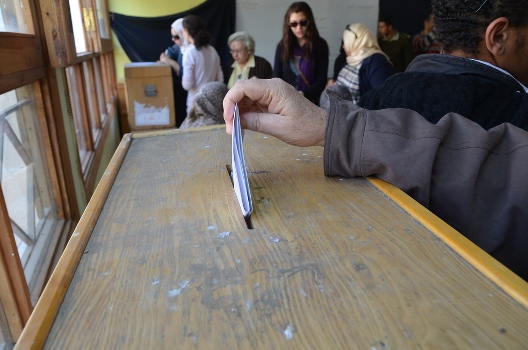 The prospect of parliamentary elections in Egypt are once again emerging after their postponement in March 2015, and according to official statements, will be held before the end of the year. President Abdel Fattah al-Sisi approved amendments to laws governing parliamentary elections and a new date for elections is due to be announced after the inauguration of the new Suez Canal on August 6. The High Electoral Commission (HEC) has also begun preparations for elections, including opening up applications to media outlets and civil society organizations who wish to cover the elections, and forming media commissions to monitor coverage. Egypt’s political parties have remained divided over their stance regarding elections and are facing further marginalization. In “To Vote or Not to Vote: Examining the Disenfranchised in Egypt’s Political Landscape,” the Atlantic Council’s Nonresident Fellow Sarah El Sirgany takes a closer look at Egypt’s electoral landscape.
The prospect of parliamentary elections in Egypt are once again emerging after their postponement in March 2015, and according to official statements, will be held before the end of the year. President Abdel Fattah al-Sisi approved amendments to laws governing parliamentary elections and a new date for elections is due to be announced after the inauguration of the new Suez Canal on August 6. The High Electoral Commission (HEC) has also begun preparations for elections, including opening up applications to media outlets and civil society organizations who wish to cover the elections, and forming media commissions to monitor coverage. Egypt’s political parties have remained divided over their stance regarding elections and are facing further marginalization. In “To Vote or Not to Vote: Examining the Disenfranchised in Egypt’s Political Landscape,” the Atlantic Council’s Nonresident Fellow Sarah El Sirgany takes a closer look at Egypt’s electoral landscape.
As Egypt appears to be slowly gearing up for its seventh venture to the polls, and second parliamentary election, since the ouster of former President Hosni Mubarak in 2011, Sirgany examines the challenges of highly polarized participants—whether political parties or the electorate—voter fatigue, an Islamist boycott of elections, and the dangers of the Muslim Brotherhood exchanging the right to vote in favor of violent confrontation.
Sirgany argues that 2011’s opening of a new political has since narrowed, and relatively new political parties struggle to attract the attention, or votes, of their constituents. Restoring voter confidence in the process, Sirgany argues, will require an effort from all participants. Political parties, she says, must develop political platforms to run on, and return to the task of investing in grassroots networks. Boycotting elections, she adds, will not have the desired effect since concessions from the government are unlikely, and boycotters have not presented an alternative path. Islamist and secular voters, she says, while differing on all else, have a shared, and misguided, strategy of playing a waiting game in the hopes of the failure of the state.
Sirgany writes:
Procedural democracy that lacks genuine participation and is not inclusive of all sectors of society has proven to be unsustainable and explosive, whether in the parliamentary elections that took place in the months before the 2011 uprising, or the various votes canceled over the past four years.
The ultimate responsibility for elections, however, she says, lies with the state:
Egyptian fatigue with politics and street action should not justify abandoning political pluralism, but rather should motivate all sides involved to find genuine and innovative approaches to revive the democratic process.
Image: Photo: Ahmed Abdel-Fatah
